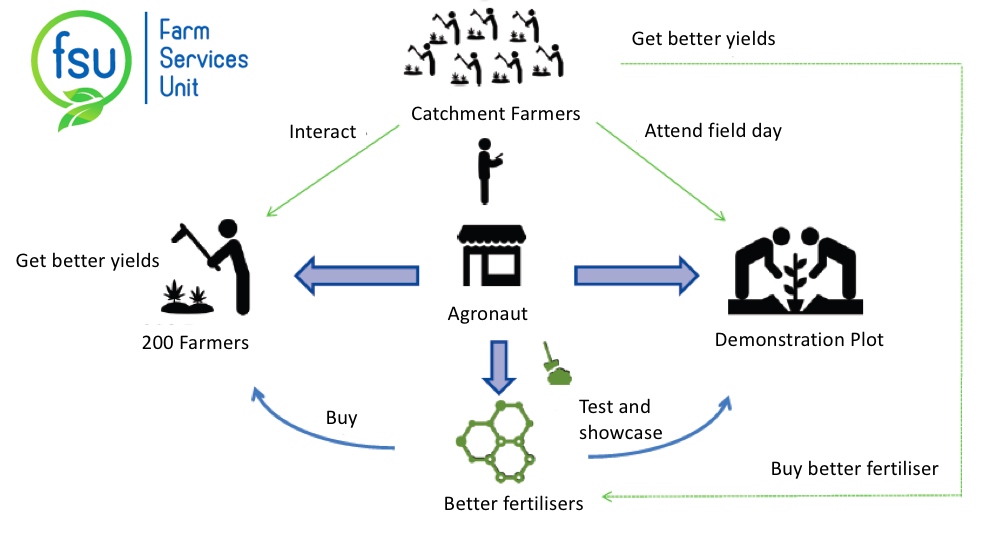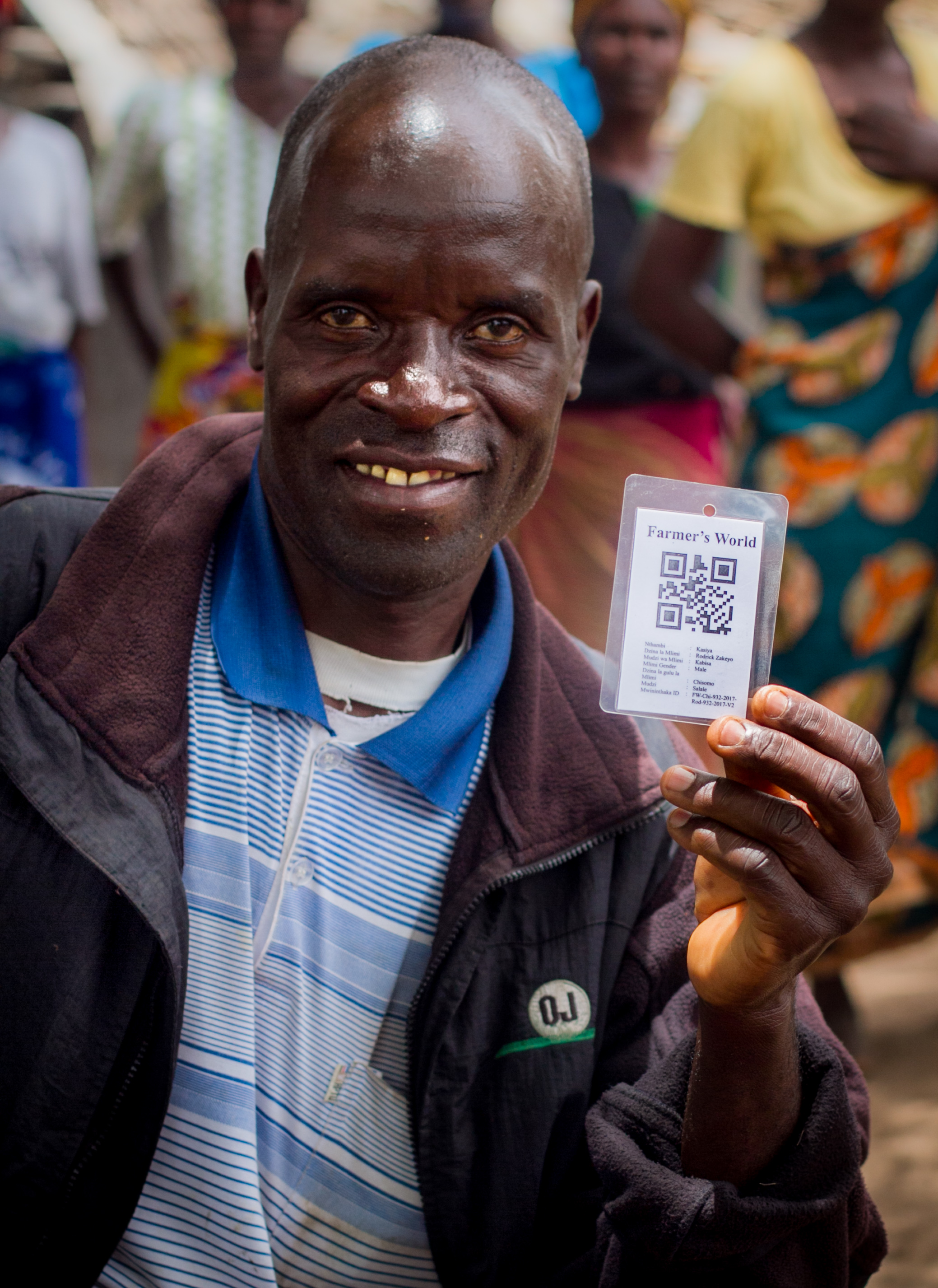Private sector extension: a sustainable agri-retailer model for improving smallholder productivity?
Central to the challenges of food security and poverty alleviation in Sub-Saharan Africa is the need to increase the productivity of smallholder farmers. Access to better inputs and agronomic advice via extension services is therefore vital. A Malawian agri-retailer is rising to these challenges by customising fertiliser blends for smallholders, using extension as a marketing strategy with a digitised data management system. This approach delivers both commercial sustainability, scaleability and the potential to double farmer yields.
Meridian, best known for its Agora and Farmers World shops across Malawi, is the country’s largest agri-retailer and a major fertiliser manufacturer. As an investee of the African Agriculture Fund (AAF), Meridian has had support for inclusive business innovations by the AAF’s Technical Assistance Facility (TAF), as explained in TAF’s Five Year Report (p44). At the heart of this work is Meridian’s new Farm Services Unit (FSU) which has a team of 60 extension officers dubbed as “agronauts”. As it has evolved over the past eighteen months the story of this unit is starting to generate interest. I believe that there are three distinct innovations behind the business model, as described below, which will make this unusual venture by an agri-retailer a commercially viable proposition.
Innovation 1: Testing local soils to develop the most appropriate fertiliser blend formulation.
Commercial farms order fertiliser blends (formulations) to suit their soil types. In contrast, until now Malawian smallholder farmers have been using one single basal compound, formulated over 30 years ago. The repeated use of this fertiliser formulation has in some cases lead to soils being severely depleted of some critical nutrients, and this has caused significant constraints in achieving good yields. The FSU unit was set up in 2016 to test smallholder farmer soils and from this develop fertiliser blend formulations that were best suited to the most popular crops. These new “blends” – branded Mwininthaka (meaning ‘owners of the soil’) – have been commercially produced and will be on Farmers World and Agora shelves this season.
Innovation 2: Using the agronaut team to increase the uptake of better fertilisers and agricultural technologies to smallholders.
Private sector extension services are not a common feature of Malawian agriculture. Government extension is thinly spread and gap-filling is most often provided by NGOs and donor projects. Any private sector extension service is typically driven by commodity agro-processors or exporters who need to procure crops from smallholders and can see the benefits of supporting them to use better agronomic techniques to improve the quality and quantity of offtake. Meridian’s model of using extension to sell to smallholders is a business model that differs from the norm.
To understand the context in which this idea was born, one has to understand the significance of the Fertiliser Inputs Subsidy Programme (FISP) in Malawi. The FISP program targets poor rural households (900,000 HH last year) to provide them with coupons for at a fertiliser at a heavily subsidised rate (approximately 70% of the value of two 50kg bags of fertiliser). Meridian’s companies are key suppliers to the FISP and are well aware that the programme is being scaled down in the face of evidence that it is not a sustainable nor cost effective means to deliver food security. This means that rather than pitching to the government for FISP contracts, Meridian and other fertiliser companies are going to have to compete directly for the business of smallholder farmers.
The FSU extension team is therefore tasked with promoting the best choice of fertiliser and complimentary products to smallholder farmers (e.g. through demonstration plots) as well as providing other agronomic training and support to help farmers improve productivity. When the season for buying fertiliser comes around, this relationship is anticipated to lead to increased sales of the Farmers World and Agora products to these farmers. The combination of better farming practices and smarter fertiliser choices should lead to increased yields and a big win for the farmers.
The illustration below (courtesy of Meridian) summarises how the agronauts operate:

Innovation 3: Digitisation through Smallholdr’s mobile app and web-based dashboards.
In the early days of the FSU, agronauts wrote their monthly work plans on paper to share with their managers. It proved very difficult for managers to keep track of what remote agronauts were doing and match this to the work plans, despite extensive use of Whatsapp as a communication tool. Farmer registration was achieved using ODK surveys, leading to spreadsheets with thousands of farmer records which required some heavy duty cleaning and management.
To increase efficiency, the FSU contracted Smallholdr in July 2017 to digitise their extension management, data collection and management systems. Following five months of development work to tailor the application to FSU’s needs, the unit’s 60 agronauts are now fully trained and using Smallholdr’s Mobile App on their tablets. The app is very user friendly and its ease of introduction was also facilitated by FSU’s foresight in recruiting tech savvy staff from the beginning, recognising that this was a critical competency. Despite the challenges of limited access to power and patchy data services in rural Malawi, the agronauts have experienced few issues in collecting data, helped by the fact that it works both online and offline.
A key feature of the Smallholdr system which empowers the agronauts is having access to the data they have collected. With ODK surveys, data vanishes from tablets when it is uploaded; with Smallholdr, an agronaut’s key farmer data is stored on the app on the tablet. Furthermore, when an agronaut’s tablet is online, they can view all of the data they have uploaded on their web-based dashboard and they can also edit it. As a result, agronauts have much greater ownership of their data and it can be cleaned at source. Access to this information also means that the agronauts can deliver bespoke advice to individual farmers based on a history of previous interactions and data collected.
Back in the office, the FSU Manager uses a dashboard to monitor the data as it arrives in real time. The agronauts are managed remotely via work plans that are allocated to them via the management dashboard directly to their Mobile App. These work plans can be standard activities, or the Manager can design and deploy bespoke surveys to selected agronauts via a simple interface (Smallholdr’s Survey Builder).

The Smallholdr system uses QR codes as unique identifiers for individuals (Malawi is still in the process of rolling out a national identity system). Meridian has printed these QR codes on cards and these are being handed out to farmers and linked to their records in the system. Not only do these cards enable seamless integration of new information onto a farmer’s record by scanning the code, but they are also going to be used to track sales in Farmers World shops. This purchase history then becomes part of a valuable dataset for market research and future marketing activities for Meridian.Beyond these three core innovations, a few potential further ideas and means of revenue generation include:
- Providing research services using the agronaut team and Smallholdr’s Survey Builder to deploy bespoke surveys for external clients
- Using the FSU ID cards as loyalty cards to further build customer relationships
- Linking smallholders to markets
- Linking smallholders to credit services by building on their track records
It is still early days for the FSU, which needs to consolidate its commercial platform within the company. However, the vision is for a win-win dynamic which will deliver a novel, scaleable and sustainable means of increasing smallholder productivity. The Smallholdr team is excited to be providing the information management system which supports this fascinating venture on its journey to delivering both commercial and developmental returns.
Smallholdr is a software as a service (SAAS) company whose software built on the Revel Engine platform. Its development was supported by a grant from the Malawi Innovation Challenge Fund.